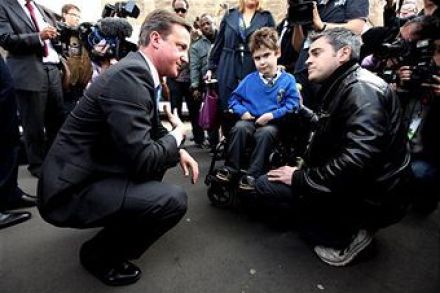Cameron’s secret weapon is amiability
David Cameron has just taken his first real “kicking” of the campaign from a parent of a disabled child. Handled it brilliantly, I think. The parent is angry, understandably, about the problems he has finding a normal school for his wheelchair-bound son. The Tories are suspicious of the “inclusion” agenda – often a code for denying special-needs children the extra tuition that they deserve. But, as the father of a severely disabled son, Cameron knows more about this subject than almost anyone else in Westminster. “It should be your choice, sir” he said: and he’s right. The voucher system would make a disabled child worth north of £22,000 a



















